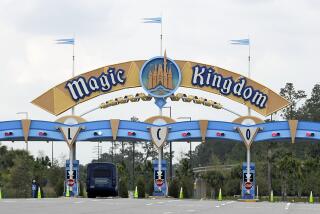Positive Numbers Don’t Tell the Whole Story in Orlando
- Share via
ORLANDO, Fla. — Everywhere you look, bulldozers push dirt or cranes haul metal beams for new buildings and theme parks as this city’s tourist-reliant economy booms.
“Help wanted” signs grace the windows of fast-food restaurants and motels. Traffic jams the city’s highways as about 100 newcomers move in each day.
Orlando’s job market is expanding at a fast pace, with 110,000 new positions expected to be created by the end of 2000. Last year, the local economy had its best performance in almost a decade with nonfarm payroll jobs increasing by almost 5%, twice the national average.
The robust economy helped the region’s population swell to 1.4 million last year. That’s nearly double from 1980 when the area had about 800,000 residents.
But the news isn’t all rosy. Employers can’t find enough skilled workers for some jobs. And many of the new positions are low-wage or part-time jobs in the entertainment and tourism business.
“To live here, you have to have two jobs. Or if you’re married, your wife has to have a job,” said Robert Alvarez, a 38-year-old airport shuttle driver who makes $7 an hour. “The pay here isn’t good enough for one job unless you have a trade or work in a profession.”
Tourism will account for more than a third of the job growth in the Orlando area by 2000, said Danielle Courtenay, a spokeswoman for the Orlando/Orange County Convention & Visitors Bureau.
“Disney and the hotels’ average wage rate isn’t high,” said David F. Scott, a professor of finance at the University of Central Florida. “We need an automobile assembly plant more than we need one more water slide park.
“That’s not saying that the entertainment and amusement sector isn’t important,” he said. “That’s the bedrock of the economy. But you have to diversify and get better stuff in here.”
Orlando is working toward that goal. Several high-tech companies including AT&T;, Oracle and Cirent Semiconductor have relocated or expanded in Orlando during the past two years, adding about 7,500 high-skill jobs.
Still, while optics and computer software are among the fastest-growing industries in Orlando, tourism is the most visible industry expanding rapidly. On the city’s outskirts, Universal Studios is building a 90-acre theme park, Islands of Adventure, and four themed hotels with a combined 4,300 rooms scheduled to open in 1999. The theme park will hire about 13,000 additional workers by 2000.
Down Interstate 4, Walt Disney World is constructing a fourth theme park, the 500-acre Animal Kingdom, that will require the hiring of 5,000 new workers.
Despite the population growth, employers are concerned about finding enough skilled workers because the local unemployment rate is extremely low. The hospitality industry, which needs 30,000 workers in the next five years, is recruiting welfare recipients who are required to find jobs under welfare reform.
“We have a major shortage,” Cheryl Taubensee, executive director of Central Florida Hotel and Motel Assn., said at a recent meeting to discuss hiring welfare recipients. “We need cleaning ladies, we need cooks, we need accountants and we need managers.”
Universal Studios has had such a difficult time finding skilled laborers such as welders and machinists that it has begun recruiting at technical schools, colleges and high schools--something it hasn’t done before, said John Sprouls, senior vice president of administration.
Seven years ago, there were 10 applicants for every open position. Nowadays there are only three, he said.
“The labor pool here is tight,” Sprouls said. “It’s going to get tighter and tighter.”
The easiest positions to fill are food service and ticket taker jobs that start at $5.67 an hour, he said. The theme park advertises openings for those jobs in local newspapers, radios and television and holds job fairs about four times a year.
Many job seekers are frustrated. “If you want to make some real money, Orlando isn’t the place,” said Gus Georgiou, 21, of Kissimmee, who applied at Sea World recently after no luck finding work as an industrial designer.
On a recent weekday, the human resources office at Universal Studios was crowded with about three dozen people waiting to apply or interview. Many were high school or college students, either unemployed or working at other low-wage service jobs.
Rita Gander, 21, and her 22-year-old friend, Celeste McNabb, planned to go to Disney to inquire about jobs after applying at Universal to be a food server and a cashier.
“There are jobs out there for people who want to work,” said Gander, who is returning to work to support her two children.
Adds her friend, a cashier at the Orange County Convention Center: “All you have to do is go out there and look and you will find them.”
More to Read
Inside the business of entertainment
The Wide Shot brings you news, analysis and insights on everything from streaming wars to production — and what it all means for the future.
You may occasionally receive promotional content from the Los Angeles Times.









